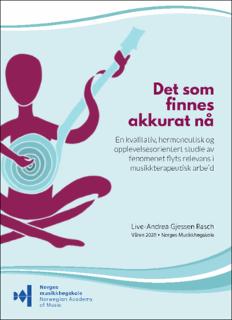| dc.contributor.author | Rasch, Live-Andrea Gjessen | |
| dc.date.accessioned | 2020-11-02T10:43:55Z | |
| dc.date.available | 2020-11-02T10:43:55Z | |
| dc.date.issued | 2020 | |
| dc.identifier.uri | https://hdl.handle.net/11250/2686028 | |
| dc.description | Norges musikkhøgskole. Masteroppgave. Musikkterapi | en_US |
| dc.description.abstract | Abstract - Flow is a central subject within music therapy practice. In literature, it’s described through several different terms, and these provide different therapeutic meanings to the client depending on the approach. The term is connected with self-reports on euphoric experiences characterized by an effortless concentration on set goals, where one's abilities correspond with the challenges given in the moment. It’s also known to change a person’s perception of time. There has been little research within the music therapy field and it’s correlation with flow as a phenomenon when it comes to specific music therapy approaches. Therefore, the purpose of this thesis is to contribute to an open discourse on flow’s relevance to music therapeutic work, as well as to speculate on how a music therapist could implement flow theory into clinical work.
The thesis asks two research questions: What is flow’s relevance to music therapeutic work, and how can it be facilitated? The questions will be answered through qualitative research based on interviews with other music therapy students, as well as my own experiences with the phenomenon from a performance perspective and musical collaboration. The empirical material will be obtained through journal notes and interviews which later will be analyzed using a thematic analysis. The purpose of this is to find an essence of the importance in the flow experiences, and how this can be brought into the music therapeutic work. The discourse is conducted across four approaches within the music therapy profession: Behavioral music therapy, analytical music therapy, creative music therapy and community music therapy. To me, choosing these four approaches was a natural way of limiting the study, with regards to presenting the literature in a structured manner and clarifying the practical process, often illustrated through clinical cases gathered from literature.
Important findings in the study are to which degree flow is relevant to the chosen approaches, which further could indicate the practical value flow inhabits in relation to music therapeutic work. An illustrative model will be presented in the conclusion, suggesting a possible way in which to implement flow on a practical level regardless of the chosen approach. | en_US |
| dc.description.abstract | Sammendrag - Flyt er et sentralt tema innen musikkterapeutisk praksis. Innenfor litteraturen beskrives det med flere synonymer, samt hvordan disse har en terapeutisk betydning for klienter innen ulike tilnærminger. Begrepet flyt forbindes med selvrapporteringer om euforiske opplevelser, karakterisert av en uanstrengt konsentrasjon over et satt mål, hvor ens evner samsvarer med utfordringene gitt. Et annet karaktertrekk ved opplevelsen er en endring av persepsjonen og oppfattelsen av tidsaspektet. Det er gjort lite forskning på selve fenomenet flyt innenfor spesifikke musikkterapeutiske retninger, dermed er formålet med denne studien å bidra til å åpne en diskurs rundt relevansen av begrepet for musikkterapeutisk arbeid, samt å spekulere i hvordan en konkret kan implementere flyt-teori på et praktisk plan. I denne studien stilles to forskningsspørsmål: Hva er begrepet flyts relevans for musikkterapeutisk arbeid, og hvordan kan det tilrettelegges for opplevelsens forekomst? Spørsmålene blir gjennomgått gjennom en kvalitativ undersøkelse basert på intervjuer av andre musikkterapistudenter, samt min egen erfaring med flyt fra et utøver- og samspillsperspektiv. Det empiriske materialet blir innhentet gjennom loggføring og intervjuer, og senere analysert gjennom en tematisk analyse med formål å finne essensen av betydningen av flytopplevelsene, og hvordan dette kan tas med inn i implementeringen av flyt i musikkterapeutisk arbeid. Diskursen blir gjort på tvers av fire valgte hovedretninger: Behavioristisk tilnærming, analytisk orientert musikkterapi, kreativ musikkterapi og samfunnsmusikkterapi. Disse fire retningene var en naturlig måte for meg å avgrense oppgaven, for å få en tydelig struktur i hvordan flyt ble gjennomgått, spesielt med tanke på tydeliggjøring av den praktiske gjennomføringen, ofte illustrert gjennom kasus-eksempler hentet fra litteratur. Viktige funn i oppgaven er i hvilken grad begrepet og fenomenet flyt viser seg å være relevant for de ulike valgte retningene, da dette kan være en indikator på hvor det kan være enklest å utføre videre forskning på nytteverdien flyt har for det musikkterapeutiske arbeidet.
Avslutningsvis presenterer jeg en modell som foreslår en mulig måte å jobbe konkret med implementeringen av fenomenet på et praktisk plan, uavhengig av perspektiv eller retning. | en_US |
| dc.language.iso | nob | en_US |
| dc.publisher | Norges musikkhøgskole | en_US |
| dc.relation.ispartofseries | Norges musikkhøgskole. Masteroppgave. Musikkterapi;2020 | |
| dc.subject | musikkterapeutisk arbeid | en_US |
| dc.subject | flyt | en_US |
| dc.subject | flow | en_US |
| dc.subject | music therapy | en_US |
| dc.title | Det som finnes akkurat nå. En kvalitativ, hermeneutisk og opplevelsesorientert studie av fenomenet flyts relevans i musikkterapeutisk arbeid | en_US |
| dc.type | Master thesis | en_US |
| dc.subject.nsi | VDP::Humaniora: 000::Musikkvitenskap: 110::Musikkterapi: 113 | en_US |
| dc.source.pagenumber | 78, [21] s. | en_US |
